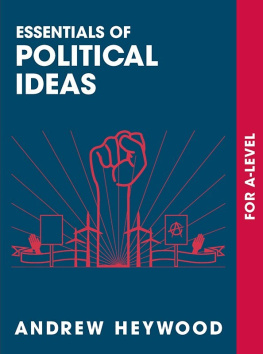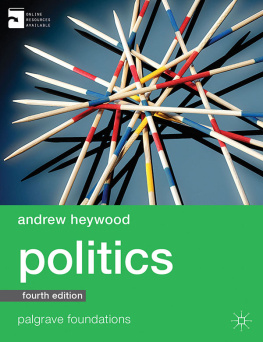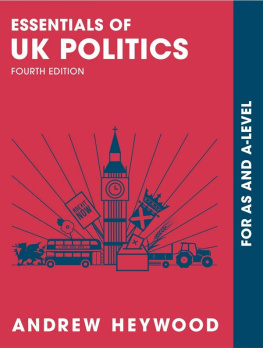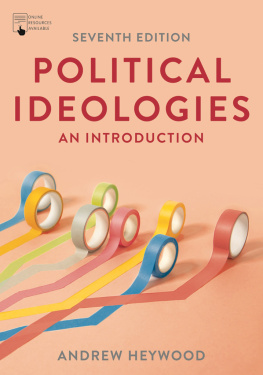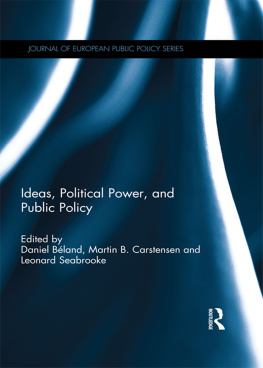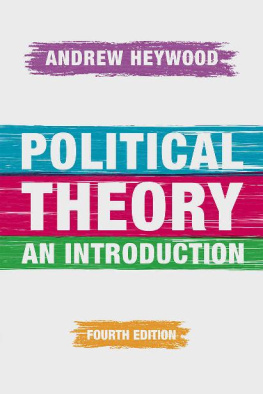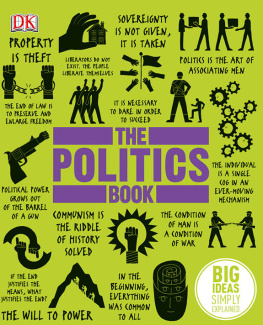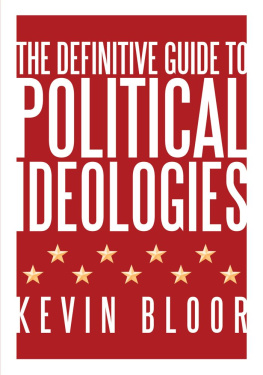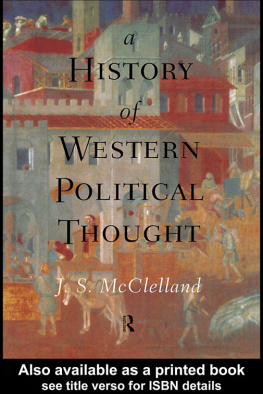ESSENTIALS OF POLITICAL IDEAS
Essentials of Political Ideas
For A-Level
Andrew Heywood

Andrew Heywood 2018
All rights reserved. No reproduction, copy or transmission of this publication may be made without written permission.
No portion of this publication may be reproduced, copied or transmitted save with written permission or in accordance with the provisions of the Copyright, Designs and Patents Act 1988, or under the terms of any licence permitting limited copying issued by the Copyright Licensing Agency, Saffron House, 610 Kirby Street, London EC1N 8TS.
Any person who does any unauthorized act in relation to this publication may be liable to criminal prosecution and civil claims for damages.
The author has asserted his right to be identified as the author of this work in accordance with the Copyright, Designs and Patents Act 1988.
First published 2018 by
PALGRAVE
Palgrave in the UK is an imprint of Macmillan Publishers Limited, registered in England, company number 785998, of 4 Crinan Street, London, N1 9XW.
Palgrave and Macmillan are registered trademarks in the United States, the United Kingdom, Europe and other countries.
ISBN 9781137611673 paperback
This book is printed on paper suitable for recycling and made from fully managed and sustained forest sources. Logging, pulping and manufacturing processes are expected to conform to the environmental regulations of the country of origin.
A catalogue record for this book is available from the British Library.
A catalog record for this book is available from the Library of Congress.
For Jean, Mark, Rob, Helen, Jessie, Oliver,
Freya, Dominic and Toby
Brief Contents
Contents
List of IllustrativeMaterial
KEY CONCEPTS
KEY FIGURES
PERSPECTIVES ON
DIFFERENCES BETWEEN
FIGURES
Using this Book
This book is a companion volume to Essentials of UK Politics, 4th edition. Together they cover two of the three parts of the new AQA and Edexcel A-Level Politics specifications (for examination from 2019 onwards) Government and politics in the UK and Political ideas. Where helpful, references are made in the current volume to extension material that can be found in Essentials of UK Politics.
In line with the specifications, the book is organised on the basis of the major political ideologies. Part 1 considers the political ideas that have emerged in connection with the traditional or core political ideologies liberalism, conservatism and socialism (). These other traditions have extended ideological thinking either by using liberal, conservative or socialist ideas to explore new or more specific areas of political debate (national identity, gender relations, cultural diversity and so on), or by challenging and seeking to go beyond liberalism, conservatism and socialism.
have a common three-part structure:
A Historical overview reflects on the origins and development of the ideology in question.
The Core ideas and principles of the ideology are then discussed. In Part 1, this is done through an examination of the ideologys distinctive approach to Human nature, Society, The state and The economy. This reflects the fact that traditional ideologies are comprehensive in scope and address all major aspects of human existence. However, in view of the narrower focus of the other ideological traditions, in Part 2 this section is organised around concepts and beliefs that are specific to the ideology in question (although reference is made to human nature, society, the state and the economy, as relevant).
The remainder of the chapter explores differing views and tensions within the ideology in question, recognising that disagreements between supporters of the same ideology are sometimes more passionate than disagreements between supporters of rival ideologies. This is done by an analysis of the ideologys major types or sub-traditions.
FEATURES OF THE BOOK
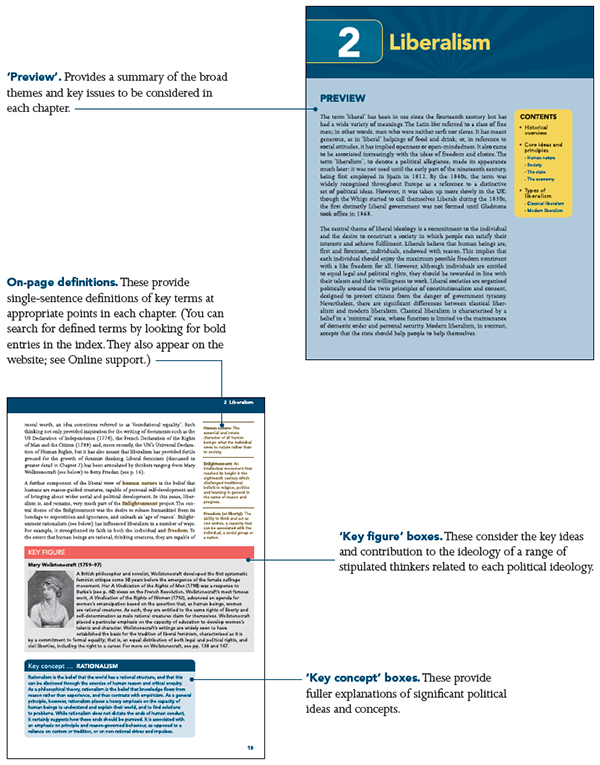
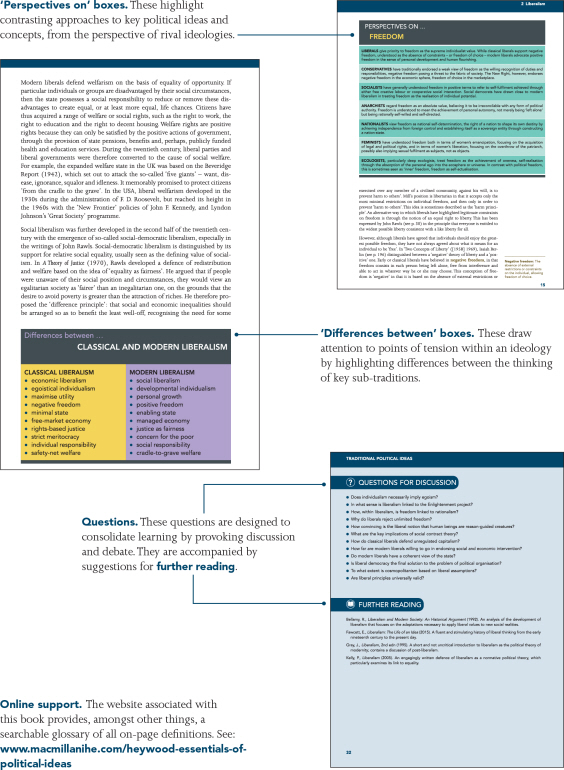
MAXIMISING PERFORMANCE
How can you ensure that your performance in Government and Politics is as good as it can be? How can you ensure exam success? Below are some helpful hints on how you can maximise your performance as you study the subject and as you prepare for the examination.
STUDYING THE SUBJECT
Keep up to date with current affairs. This will both make the subject more interesting to study (politics never stands still) and give you useful ammunition to use in the examination. Your knowledge needs to be as up-to-date as possible, and examiners are particularly looking to reward contemporary knowledge and understanding. Use websites, read a quality newspaper (many of which can be accessed online) and articles in journals such as Politics Review, and watch the news and current affairs programmes on television.
Understand key terms and concepts. Much of political understanding is based on a grasp of major terms and concepts democracy, representation, authority, freedom, justice, and so on. Make sure you have a thorough grasp of these terms, and be sure that you can define and explain them reliably in the examination itself.
Be aware of competing viewpoints. Just about every issue in politics is the subject of debate and discussion. You need to show an awareness of the different sides of an argument almost every statement you make in politics could be followed by However. But you also need to develop your own views, which means being able to support a particular viewpoint on the basis of evidence make a point and prove it.
PREPARING FOR THE EXAMINATIONS
Draw up a revision plan. Revision is seldom done effectively if it is left until the mood takes you. Draw up a plan of which topics you are going to revise and when and then stick to it!
Know your specification inside out. You have an outline above of the main topics covered in each unit. But the specification itself, as well as supporting materials provided by the awarding body for students, provides you with greater detail, including the identification of key concepts and an outline of the content.
Be familiar with past papers, marking schemes and examiners reports. These are all provided by awarding bodies, and they contain invaluable information about the kinds of questions that will come up and the level of performance that will be expected.
Have as much exam practice as possible. In the run-up to the examination, frequently practise answering examination questions in examination conditions and within examination timescales. If nothing else, this will ensure that your do not get your timings wrong the silliest of all reasons for poor exam performance.
Pay attention to command words and key terms in questions. These are words such as define, explain, analyse, assess or evaluate. You need to know what each of these words means to ensure that you carry out the right task in answering each question. For example:
Define say what a word or phrase means
Features the parts that define what a thing is
Functions the roles that highlight what a thing does
Explain show how something works, often by identifying causes and effects
Next page
